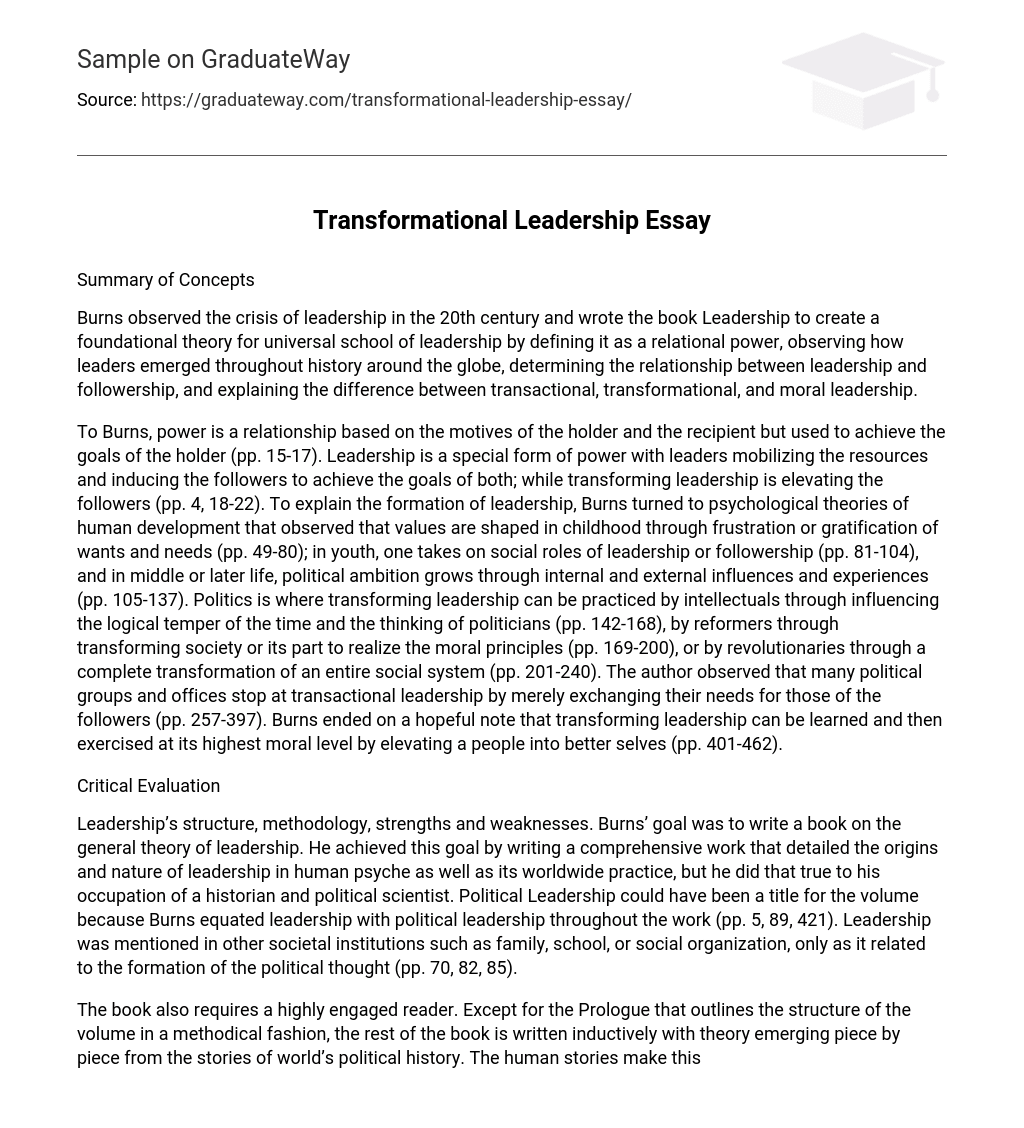Summary of Concepts
Burns observed the crisis of leadership in the 20th century and wrote the book Leadership to create a foundational theory for universal school of leadership by defining it as a relational power, observing how leaders emerged throughout history around the globe, determining the relationship between leadership and followership, and explaining the difference between transactional, transformational, and moral leadership.
To Burns, power is a relationship based on the motives of the holder and the recipient but used to achieve the goals of the holder (pp. 15-17). Leadership is a special form of power with leaders mobilizing the resources and inducing the followers to achieve the goals of both; while transforming leadership is elevating the followers (pp. 4, 18-22). To explain the formation of leadership, Burns turned to psychological theories of human development that observed that values are shaped in childhood through frustration or gratification of wants and needs (pp. 49-80); in youth, one takes on social roles of leadership or followership (pp. 81-104), and in middle or later life, political ambition grows through internal and external influences and experiences (pp. 105-137). Politics is where transforming leadership can be practiced by intellectuals through influencing the logical temper of the time and the thinking of politicians (pp. 142-168), by reformers through transforming society or its part to realize the moral principles (pp. 169-200), or by revolutionaries through a complete transformation of an entire social system (pp. 201-240). The author observed that many political groups and offices stop at transactional leadership by merely exchanging their needs for those of the followers (pp. 257-397). Burns ended on a hopeful note that transforming leadership can be learned and then exercised at its highest moral level by elevating a people into better selves (pp. 401-462).
Critical Evaluation
Leadership’s structure, methodology, strengths and weaknesses. Burns’ goal was to write a book on the general theory of leadership. He achieved this goal by writing a comprehensive work that detailed the origins and nature of leadership in human psyche as well as its worldwide practice, but he did that true to his occupation of a historian and political scientist. Political Leadership could have been a title for the volume because Burns equated leadership with political leadership throughout the work (pp. 5, 89, 421). Leadership was mentioned in other societal institutions such as family, school, or social organization, only as it related to the formation of the political thought (pp. 70, 82, 85).
The book also requires a highly engaged reader. Except for the Prologue that outlines the structure of the volume in a methodical fashion, the rest of the book is written inductively with theory emerging piece by piece from the stories of world’s political history. The human stories make this a lively read, an analysis of various systems of government worldwide makes it an indispensable political guide, but it is not a straightforward theoretical study. The reader needs to look for the tenets of Burns’ leadership theory spread throughout the work and sometimes summarized in chapter conclusions.
Even though Burns expertise was American history and politics, he did a superb job of studying expressions of leadership in cultures throughout the globe from British parliamentary monarchy to Communist China to developing African nations. Nevertheless, his own political bias of a liberal Democrat was implicit in both frequent critique of conservative American values such as limited government or individualism (pp. 272-279, 313), as well as somewhat sympathetic evaluation of Communism as less totalitarian than Nazism (pp. 332-34) with Mao Tse-tung praised as a “brilliantly successful genius” of transforming leadership (pp. 235, 404).
Leadership in light of leadership studies. Burns’ Leadership has been generally considered a monumental landmark for leadership studies. Despite its political emphasis, it contains universal truths that can be applied to leadership across various disciplines. Among its numerous contributions, three stand out the most due to their transforming significance.
First, Burns established that the general theory of leadership is possible thanks to the studies in humanistic psychology that allow generalizations about the leadership process; thus, the school of leadership can be developed in the 20th century (pp. 2-3, 427). There has hardly been a leadership theory work written since 1978 that has not devoted chapters to discussing Burns’ transforming leadership, as did Northouse (2018) and Yukl (2013), or developed the concept further, as did Bass and Avolio (1997).
Secondly, Burns emphasized the reciprocal nature of leadership where the followership is equally important. He insisted that people should not be treated as things or manipulated as previous leadership writings had suggested (pp. 446-48). Burns said that moral leadership is a sharing relationship in which “the leaders perceive their roles as shaping the future to the advantage of the groups with which they identify, an advantage they define in terms of the broadest possible goals and the highest possible levels of morality” (p. 448).
Lastly, Burns insisted that leadership can be taught because education done right is a form of transforming leadership (pp. 448-49). Leaders and educators can extend awareness of human needs and improve the larger social situation for which they are responsible (p. 449). Therefore, Burns Leadership passed its own test by becoming a work full of transforming and morally elevating truths that made a lasting change in leadership studies (p. 414).





